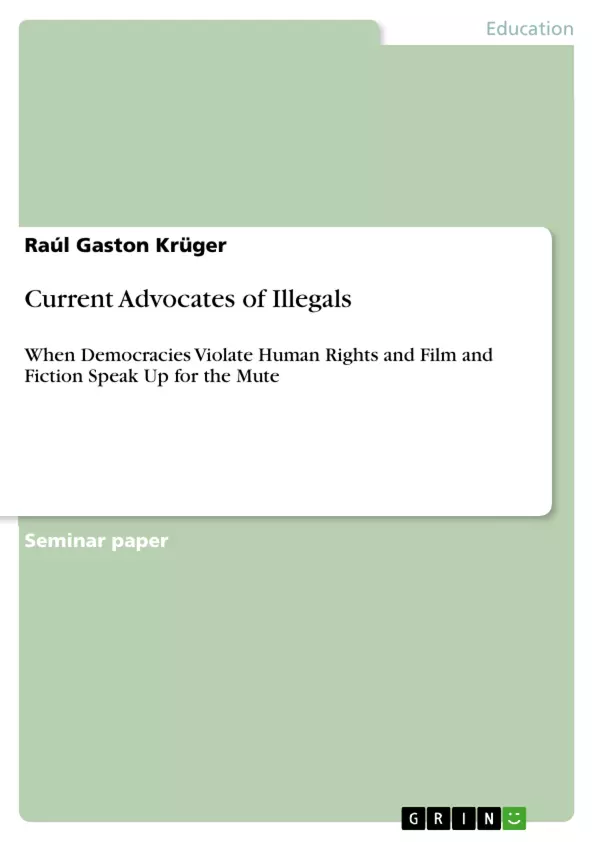Writers, screenwriters and directors are magicians; they can carry us off to the most mythical and enchanted worlds, they can make the sweetest dreams come true, and they can make us dream and hope. But sometimes they are advocates, even more than they are magicians; they make us see invisible things, while they are showing us the real world and, in some cases, the real world is far from a sweet dream and without hope.
“To reveal the invisible […] not only changes the way we see the world, it changes our responsibilities in it” (Hovet, The Invisible London). That is what they sometimes need to do, make us feel responsible. For that reason current authors and directors show us the invisible world of illegals, they give faces and stories to ghosts that often are misused from politics and media to create fear. Fear that is needed to justify the state of exception and the state of exception is needed to maintain or expand political power.
This paper is concerned with the film Dirty Pretty Things directed by Stephen Frears, and the novels Refugee Boy by Benjamin Zephaniah and A Distant Shore by Caryl Phillips. It uses them as representatives of the attempt of writers and directors to give voice to the group of illegal immigrants who do not have a political voice by themselves. As Frears phrases it, “Asylum is a huge political issue and the government doesn’t handle it very well. […] There’s no attempt made to explain the problem, to explain that these people are serious.” (Lucia, Interview 9) Thus, the authors try to explain the problem and they have obviously another point of view than their governments. To what extent the self-appointed advocates defend the interests of illegals and in how far they can change prejudices, distorted images and, at least, political decisions should be discussed in this paper.
The emphasis lies here on Great Britain as one major representative of the western countries, for the novels and the film deal with situations in the United Kingdom. Further-more, the change in immigration policy in the last decade there was and is largely and controversially discussed.
Inhaltsverzeichnis (Table of Contents)
- Introduction
- Accusation: Democracies Violate Human Rights
- Advocates of Human Rights
- Dirty Pretty Things, directed by Stephen Frears
- Refugee Boy, written by Benjamin Zephaniah
- A Distant Shore, written by Caryl Phillips
- The Trial and the Jury
- The Judgment
Zielsetzung und Themenschwerpunkte (Objectives and Key Themes)
This paper analyzes the film "Dirty Pretty Things" directed by Stephen Frears and the novels "Refugee Boy" by Benjamin Zephaniah and "A Distant Shore" by Caryl Phillips. It explores how these works serve as a platform for giving voice to the often silenced community of illegal immigrants in the United Kingdom. The paper aims to understand the extent to which these authors and filmmakers defend the interests of illegal immigrants and how they challenge existing prejudices and distorted perceptions. It further examines the potential impact of these works on political decisions surrounding immigration policies.
- The violation of human rights by democracies, specifically focusing on the treatment of illegal immigrants.
- The role of writers and filmmakers as advocates for the voiceless, particularly illegal immigrants.
- The use of fear and "state of exception" as political tools to justify restrictive immigration policies.
- The impact of media representations on public perception and political decision-making.
- The need for a more humane and just approach to immigration policies in Western democracies.
Zusammenfassung der Kapitel (Chapter Summaries)
The introduction establishes the paper's focus on the representation of illegal immigrants in contemporary British film and literature. It argues that these works are not merely fictional narratives, but also acts of advocacy, challenging the prevailing political discourse and giving a voice to those who are often marginalized and silenced.
The first chapter explores the accusation that democracies violate human rights through their treatment of illegal immigrants. It draws on Giorgio Agamben's concept of "homo sacer" to analyze the legal and social status of illegals, highlighting their exclusion from the political sphere and their reduction to "bare life" rather than participating citizens.
Schlüsselwörter (Keywords)
The key concepts explored in this paper include illegal immigration, human rights, democracy, state of exception, biopolitics, media representation, advocacy, and the portrayal of illegal immigrants in literature and film. The paper focuses on the United Kingdom as a case study of Western democracies grappling with complex immigration challenges. The works analyzed, "Dirty Pretty Things," "Refugee Boy," and "A Distant Shore," provide rich insights into the experiences of illegal immigrants and the political and social forces that shape their lives.
Frequently Asked Questions
How are illegal immigrants represented in British literature?
Authors like Zephaniah and Phillips give "ghosts" a face and story to challenge political fear-mongering.
What is the "state of exception" in this context?
A political tool used to justify restrictive policies by creating fear and suspending normal legal rights for certain groups.
What is the focus of the film "Dirty Pretty Things"?
Directed by Stephen Frears, it portrays the invisible world and human rights struggles of illegal immigrants in London.
Who is "homo sacer"?
A concept by Giorgio Agamben describing individuals reduced to "bare life" without political or legal protection.
Can film and literature change prejudices?
The paper discusses to what extent artistic advocacy can influence public perception and political decisions.
- Quote paper
- Raúl Gaston Krüger (Author), 2009, Current Advocates of Illegals, Munich, GRIN Verlag, https://www.grin.com/document/175764



